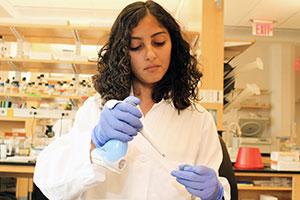PhD in Biology

The PhD program in Biology is a research-intensive program that also has a strong focus on teaching, designed to produce top scientists and educators with a broad base of knowledge to tackle the most important biological problems of today. This is accomplished through research training, graduate-level courses, seminars, and teaching experience. Entering students are assigned an advisory committee of three faculty members who work with the student to plan a suitable program based on the student's experience and interests.
PhD students in Biology receive full tuition support for six years, a competitive stipend, health coverage, and receive extensive training in pedagogy, outreach, and communication that prepares them for careers in academia, biotechnology, education, and policy. Students are required to serve as teaching assistants for at least two semesters. Most students complete the requirement for teaching experience in the first year by assisting in the introductory undergraduate biology courses for two semesters.
During the first year, students become familiar with research opportunities in the department by doing short research rotations with various faculty members. This experience in expected to lead to the selection of a research focus for the PhD thesis, and it also sets the stage for cross-disciplinary approaches to the thesis topic that is pursued.
First- and second-year students usually take some graduate courses that are selected in consultation with the advisory committee, in addition to one required course: either Biology 243: Topics in Molecular and Cell Biology; Biology 244: Topics in Evolutionary Ecology; or Biology 246: Topics in Physiology and Animal Behavior.
The department faculty are educators as well as researchers, and the graduate students benefit from this expertise. Graduate students serving as teaching assistants have the opportunity to take a course on teaching and pedagogy to improve their skills, or to become involved with upper level courses in their area of expertise. In addition, we offer a one-month summer program for PhD students interested in contributing to course design and honing their teaching skills via GIFT, the Graduate Institute For Teaching.
Beginning in their second year, graduate students present an annual research seminar to update their research progress and to gain experience in formal presentation of their work. Training in communicating research is an important aspect of our training program. Students obtain support and feedback on their seminars, and we offer a course on Science Communication (Bio 262).

Research Concentrations
Browse the six concentration areas below for recommended programs of study and relevant courses:
- Biology Education Research
- Ecology, Behavior and Evolution
- Global Change Biology
- Molecular Genetics and Biochemistry
- Developmental Biology
- Physiology, Neurobiology and Animal Behavior
Graduate credit for a course requires a grade of B- (B minus) or better. A list of biology department undergraduate and graduate courses can be found by selecting the Courses button from the top bar.
Throughout the year, graduate students benefit from a variety of seminars on current research that are presented by faculty, fellow graduate students, and invited speakers.